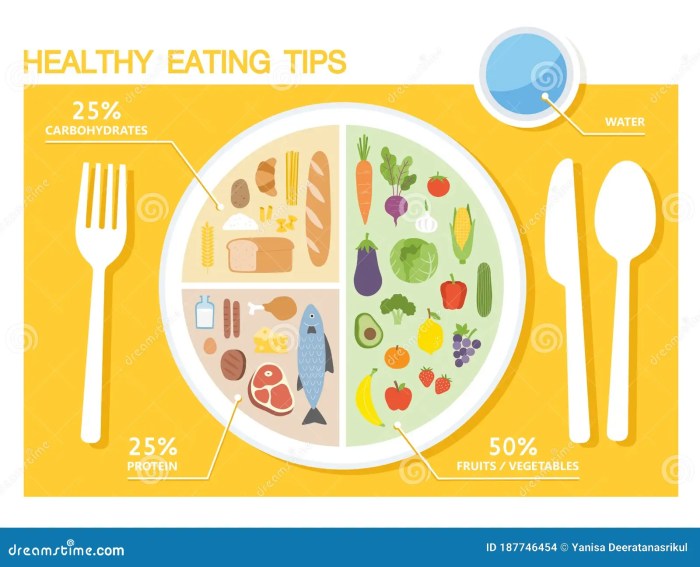Balanced Diet Tips sets the stage for this enthralling narrative, offering readers a glimpse into a story that is rich in detail with american high school hip style and brimming with originality from the outset.
For anyone looking to improve their overall health and well-being, understanding the importance of a balanced diet is essential. This guide will provide you with valuable insights and practical tips to achieve a healthier lifestyle through balanced eating habits.
Importance of a Balanced Diet
Maintaining a balanced diet is essential for overall health and well-being. It provides the necessary nutrients that our bodies need to function properly and stay healthy.
Nutrients in a Balanced Diet
A balanced diet should include a variety of nutrients such as:
- Proteins: essential for building and repairing tissues in the body.
- Carbohydrates: the main source of energy for the body.
- Fiber: important for digestive health and maintaining a healthy weight.
- Vitamins: crucial for various bodily functions such as immune system support and energy production.
- Minerals: like calcium and iron, necessary for bone health and oxygen transport in the body.
Benefits of a Balanced Diet
Eating a balanced diet offers numerous benefits for long-term health, including:
- Reduced risk of chronic diseases like heart disease, diabetes, and certain cancers.
- Improved energy levels and overall mood.
- Better weight management and a lower risk of obesity.
- Enhanced immune function to fight off illnesses and infections.
- Support for healthy growth and development, especially in children and adolescents.
Components of a Balanced Diet
Eating a variety of foods from different food groups is essential for maintaining a balanced diet. Each food group provides essential nutrients that our bodies need to function properly.
Fruits and Vegetables
Including a generous amount of fruits and vegetables in your daily meals is crucial for a balanced diet. These foods are rich in vitamins, minerals, fiber, and antioxidants that help boost our immune system, improve digestion, and reduce the risk of chronic diseases. Aim to fill half your plate with colorful fruits and vegetables at every meal.
Proteins
Proteins are essential for building and repairing tissues in our body. Include lean sources of protein such as chicken, turkey, fish, beans, lentils, and tofu in your diet. Protein also helps in maintaining muscle mass and keeping you feeling full and satisfied.
Carbohydrates
Carbohydrates are our body’s primary source of energy. Opt for complex carbohydrates like whole grains, fruits, vegetables, and legumes that provide sustained energy throughout the day. Avoid or limit intake of simple carbohydrates like sugary snacks and refined grains.
Fats, Balanced Diet Tips
Healthy fats are necessary for absorbing fat-soluble vitamins and supporting brain function. Include sources of unsaturated fats like avocados, nuts, seeds, and olive oil in moderation. Limit saturated fats found in fatty meats, full-fat dairy, and processed foods to maintain a healthy heart.
Tips for Achieving a Balanced Diet: Balanced Diet Tips

Maintaining a balanced diet is essential for overall health and well-being. Here are some practical tips to help you plan nutritious meals, practice portion control, and make mindful food choices.
Plan Your Meals
- Start by making a grocery list based on nutrient-dense foods like fruits, vegetables, whole grains, lean proteins, and healthy fats.
- Prepare meals in advance to avoid relying on unhealthy fast food options when you’re in a rush.
- Include a variety of colors on your plate to ensure you’re getting a wide range of vitamins and minerals.
Practice Portion Control
- Use smaller plates to help control portion sizes and prevent overeating.
- Pay attention to serving sizes and avoid mindlessly snacking in front of the TV or computer.
- Listen to your body’s hunger and fullness cues to know when to stop eating.
Mindful Eating
- Eat slowly and savor each bite to fully appreciate the flavors and textures of your food.
- Avoid distractions while eating, such as scrolling through your phone or watching TV, to focus on your meal.
- Be mindful of emotional eating triggers and find alternative ways to cope with stress or boredom.
Embrace Moderation and Variety
- Allow yourself to enjoy your favorite treats in moderation to prevent feelings of deprivation.
- Experiment with new foods and recipes to keep your meals exciting and diverse.
- Balance your food choices throughout the day to ensure you’re meeting all your nutritional needs.
Common Myths About Balanced Diets

When it comes to balanced diets, there are several myths that can mislead people and prevent them from making healthy choices. Let’s debunk some of the most common misconceptions to set the record straight.
Myth: Carbs are Bad for You
One of the most prevalent myths is that carbohydrates are bad for your health and should be avoided. However, carbohydrates are essential for providing energy to the body, especially for high-intensity activities. The key is to choose complex carbohydrates like whole grains, fruits, and vegetables, instead of refined carbs like white bread and sugary snacks.
Myth: Fats Should Be Completely Eliminated
Another common myth is that all fats are unhealthy and should be eliminated from your diet. In reality, fats are necessary for various bodily functions and can be beneficial when consumed in moderation. Healthy fats like those found in avocados, nuts, and olive oil can actually support heart health and brain function.
Myth: Skipping Meals Helps with Weight Loss
Some people believe that skipping meals is an effective way to lose weight. However, skipping meals can lead to overeating later in the day and may cause your metabolism to slow down. Instead of skipping meals, focus on eating smaller, balanced meals throughout the day to support your weight loss goals.
Myth: All Calories Are Equal
It’s a common misconception that all calories are equal, regardless of where they come from. In reality, the source of calories matters when it comes to nutrition. For example, 100 calories from a sugary drink will affect your body differently than 100 calories from a nutrient-dense meal. Focus on quality over quantity when it comes to calories.
